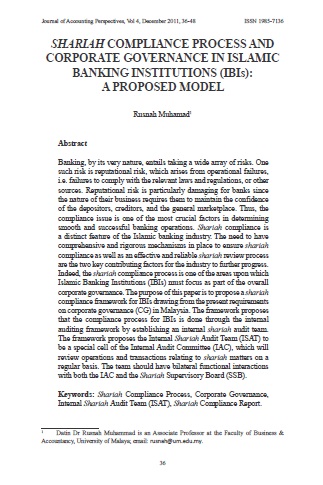Shariah Compliance Process and Corporate Governance in Islamic Banking Institutions (IBIs): A Proposed Model
DOI:
https://doi.org/10.22452/AJAP.vol4no1.3Keywords:
Shariah Compliance Process, Corporate Governance, Internal Shariah Audit Team, Shariah Compliance ReportAbstract
Banking, by its very nature, entails taking a wide array of risks. One such risk is reputational risk, which arises from operational failures, i.e. failures to comply with the relevant laws and regulations, or other sources. Reputational risk is particularly damaging for banks since the nature of their business requires them to maintain the confidence of the depositors, creditors, and the general marketplace. Thus, the compliance issue is one of the most crucial factors in determining smooth and successful banking operations. Shariah compliance is a distinct feature of the Islamic banking industry. The need to have comprehensive and rigorous mechanisms in place to ensure shariah compliance as well as an effective and reliable shariah review process are the two key contributing factors for the industry to further progress. Indeed, the shariah compliance process is one of the areas upon which Islamic Banking Institutions (IBIs) must focus as part of the overall corporate governance. The purpose of this paper is to propose a shariah compliance framework for IBIs drawing from the present requirements on corporate governance (CG) in Malaysia. The framework proposes that the compliance process for IBIs is done through the internal auditing framework by establishing an internal shariah audit team. The framework proposes the Internal Shariah Audit Team (ISAT) to be a special cell of the Internal Audit Committee (IAC), which will review operations and transactions relating to shariah matters on a regular basis. The team should have bilateral functional interactions with both the IAC and the Shariah Supervisory Board (SSB).
Downloads

Downloads
Published
How to Cite
Issue
Section
License
License
The Asian Journal of Accounting Perspectives (AJAP) articles are published under a licence equivalent to the Creative Commons Attribution-NonCommercial-NoDerivs License (CC BY-NC-ND). The licence allows users to copy, distribute, and transmit an article as long as the author is attributed. The article is not used for commercial purposes. The work is not modified or adapted in any way.
Copyright
Authors are required to sign the Exclusive License to Publish agreement upon publication in the AJAP. The agreement grants the Publisher (Faculty of Business and Accountancy, Universiti Malaya) to publish and disseminate the articles.
Open Access
Articles published in the AJAP are digital, online, free of charge, and free of most copyright and licensing restrictions.
Article Processing Charge
Articles publish in AJAP is free submission, production and publication charges. However, all accepted articles are required for language editing. The AJAP officially appointed and outsourced proofreader will conduct this process, and the authors will cover the cost. AJAP does not profit from this process and transaction.
